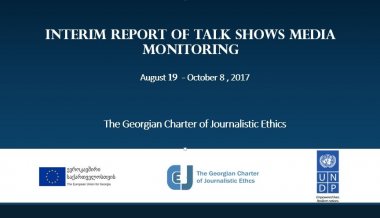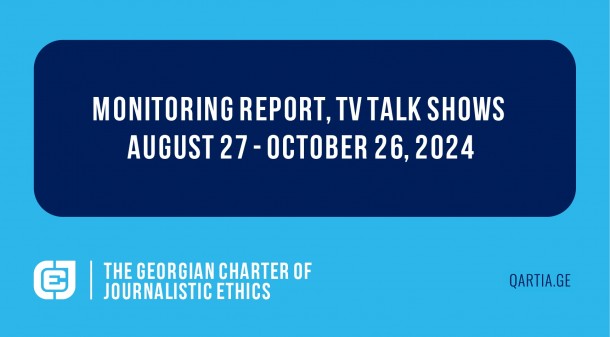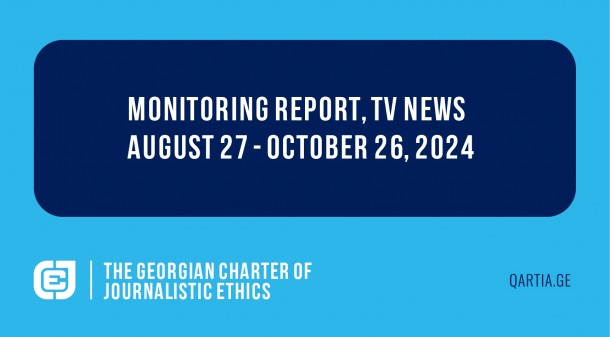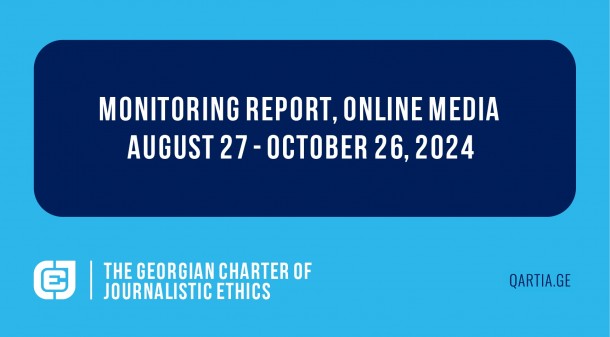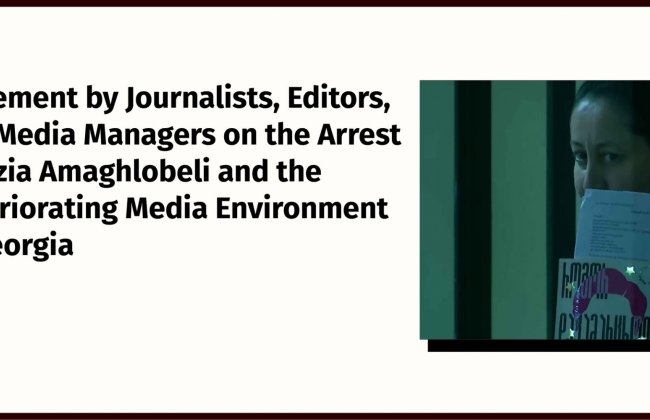06.11.2017
The Georgian Charter of Journalistic Ethics is implementing the
monitoring of talk shows for coverage of the 2017 Local Government
Elections within the framework of the project Study and Research on
Election Media Coverage for 2017 Local Government Elections in
Georgia supported by the European Union (EU) and the United Nations
Development Programme (UNDP).Monitors observe 14 TV Channel's primetime political talk shows and the parts of the news programs which offer audience more than 10 minutes’ interview time with respondents. Monitoring is carried out on the following TV channels: Public Broadcaster, Rustavi 2, Imedi, Pirveli, Obiektivi, Ajara Public Broadcaster, TV Channel 25, Rioni, Gurjaani, Guria, Kvemo Kartli, Trialeti, Odishi and Ninth Channel. Out of the TV channels that are monitored, five channels are national stations, while nine are regional. The monitoring started on August 19, 2017. Part of the talk shows were first aired in early September, and some even later. TV companies "Odishi" and "Gurjaani" have not aired any talk shows. The given report reflects the analysis of the programs that aired from August 19 to October 9
Full Report
Key Findings:
- Unlike 2016, national broadcasters offered a strictly scripted talk show where all qualified election subjects were invited and therefore the criteria of inviting guests to the program was clear. If any of the candidates did not attend the program, the hosts were informing the audience about it. In almost all cases, the balance between the guests was preserved.
- In the talk shows, where the time was strictly defined for the candidates to present their vision and opinions, the focus was on the format of the program and not on the content. The proposed format looked more like the presentation of candidates rather than a typical talk show. However, this format contributed to equal distribution of time among the reposndents.
- Apart from a rare exception, every candidate was provided equal opportunity to present their campaign promises to the public, but there was less critical discussion of the election programs.
- In general, the questions of the TV presenters were very broad and did not derive from a specific election program. The hosts did not ask critical and counter questions, so it remained unclear for the voters whether the campaign promises of candidates were realistic.
- As during the 2016 elections, broad questions were asked, such as: "What do you promise to the voters? What problem will you solve first? How many mandates are you going to take in elections?" This enabled the respondents to lead the discussion into the direction convenient to them.
- The problem of the qualification of the TV presenters was particularly noticeable on the regional channels, where there were practically no critical questions asked.
- In general, regional broadcasters have significant technical problems related to the voice, visual side, packaging of the program. These problems make the programs less attractive to the audience.
- Several cases of hate speech were observed, but such was mainly used by the respondents. The hosts often reacted adequately. There was one case when the host contributed to strengthening gender stereotypes.
- The TV company Obiektivi is different from any other channels. Its program - "Night Studio" is a platform for the political party Alliance of Patriots. The program mostly hosts the party members. 48 representatives of Alliance of Patriots visited the "Night Studio" during the monitoring period and only one of the other qualified subjects were invited to the program. The program is full of anti-western and anti-Turkish rhetoric, hate speech, insulting vocabulary and unanswered allegations against opponents.

